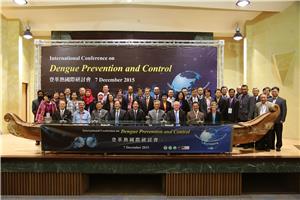Taiwan and the United States jointly organized the "Dengue International Symposium and Consultation Expert Meeting" to fight the threat of dengue pandemic caused by global warming (2015-12-07)
GCTF Training Camps.Dec 27

The "Global Cooperation and Training Framework" signed by China and the US government in accordance with Taiwan and the United States, jointly organized by the University of Green Magic School and the Ministry of Health and Welfare in the two days of today and tomorrow (December 7-8) Cum consulting expert meeting." The seminar invited 12 dengue prevention experts from 12 countries to exchange and share dengue prevention technology and experience, and environmental protection or health officials from 10 countries in Asia Pacific and Southeast Asia shared the status of dengue prevention and control in various countries. It is hoped that through the communication platform of this seminar, we will establish a close epidemic prevention network between China and Asia-Pacific and Southeast Asia countries suffering from dengue threats, and jointly improve the regional prevention of dengue heat energy and maintain global health security.
The total number of participants at home and abroad was 190, including domestic and foreign experts and scholars, national representatives, central and local government dengue prevention business colleagues and biotechnology industry. Among them, the national representatives are high-ranking officials in the health and environmental units responsible for dengue prevention and control strategies, from Singapore, Japan, the Philippines, Indonesia, India, Malaysia, Vietnam, Thailand, Myanmar, Papua New Guinea and other 10 countries. In the meeting, the host of Australia's "Destroyed Dengue Program", O'Neill, introduced the new technology of using Wolbachia to fight dengue fever; Professor Johnson of the State University of New York discussed the role and influence of community participation in dengue prevention strategies; Director Liao Jinglun of the National Guardian of China introduced the development of dengue vaccine; the head of the Department of Disease Control, Yang Jinghui, reported on the current status of dengue fever and challenges in China.
The CDC said that the election of this seminar in Tainan has two special significances: one is to commemorate the 50th anniversary of the eradication of malaria in China; the other is Tainan's outbreak of this dengue fever this year. On December 4, 1965, China was awarded the Malaria Eradication Test by the World Health Organization, becoming one of the few countries in the world to successfully eradicate malaria. This proud achievement is not only an important milestone in the history of public health development in China, but also the beginning of anti-epidemic cooperation between Taiwan and the United States. Therefore, China has turned from a recipient country to a donor country, and cooperated with the United States to conduct training to help third countries improve their epidemic prevention. Quantitative energy and the responsibility of the world's citizens. In Tainan City, a severe dengue epidemic broke out this year, killing 112 people and facing an unprecedented epidemic prevention challenge. Fortunately, under the concerted efforts of all walks of life, the dengue fever epidemic was effectively controlled. At this moment, the international seminar on dengue fever was held in Tainan, which is of far-reaching significance.
Through this seminar, national dengue enthusiasts can take the opportunity to exchange learning and experience sharing, establish a dengue network in Asia-Pacific and Southeast Asia, expand opportunities for inter-regional cooperation, and effectively improve the prevention and control of regional infectious diseases.
